Deprescribing Research: What Happens When You Stop Unnecessary Medications

Medication Risk Assessment Tool
How This Tool Works
Based on the article's research, this tool estimates the risk level of your current medications and identifies potential candidates for deprescribing. It uses factors mentioned in the study: age, chronic conditions, and medication types.
Results are not medical advice. Always discuss medication changes with your doctor.
What Is Deprescribing, Really?
Deprescribing isn’t just stopping pills. It’s a careful, planned process where doctors and patients work together to cut out medicines that might be doing more harm than good. This isn’t about skipping your heart pill or insulin. It’s about looking at the full list - the blood pressure meds, the sleep aids, the acid reflux drugs, the cholesterol pills - and asking: Do I still need this?
It started because too many older adults are taking five, ten, even fifteen different medications. A 2023 study found that 40% of seniors in the U.S. take five or more drugs daily. That’s not normal aging. That’s polypharmacy - and it’s risky. Every extra pill adds a chance of side effects, falls, confusion, or dangerous interactions. Deprescribing flips the script: instead of adding more, you ask what can come off.
How It Works: Five Steps to Safer Medication Use
Deprescribing isn’t guesswork. It follows a clear, step-by-step method used by clinics in Canada, Australia, and the U.S. Here’s how it actually plays out:
- Identify the culprits. Which drugs are potentially inappropriate? These are meds with weak benefits for your current health, high risk of side effects, or no clear purpose anymore - like a statin for someone with advanced dementia or a daily aspirin for someone who’s had no heart issues in 15 years.
- Check if it’s safe to stop. Not all meds can be stopped cold turkey. Some need to be tapered slowly. A benzodiazepine for sleep? Abruptly stopping it can trigger seizures. A proton pump inhibitor for heartburn? Stopping suddenly might make reflux worse for a few weeks. Your doctor checks the science and your history to know how to proceed.
- Make a plan. This includes how fast to reduce the dose, what symptoms to watch for, and when to check back in. Most guidelines say: stop one drug at a time. That way, if you feel better - or worse - you know why.
- Watch closely. After stopping, you’re monitored. Are you sleeping better? Less dizzy? More alert? Or did your blood pressure spike? Did your joint pain come back? These aren’t just notes. They’re data that tells you if the move was right.
- Document it. Every change is written down - what was stopped, why, how, and what happened. This isn’t bureaucracy. It’s safety. If you see a new doctor or end up in the ER, they need to know what you’re not taking anymore.
What Does the Research Say About Results?
People assume stopping meds will make things worse. But the data says otherwise - mostly.
A major review in JAMA Network Open (March 2023) looked at 37 studies involving over 12,000 older adults. The average person was taking nearly 10 medications. After deprescribing, they were taking about one fewer. That might sound small - until you realize: in a clinic with 2,000 patients, that’s 140 fewer pills prescribed every year. That’s fewer side effects, fewer hospital visits, fewer falls.
Other studies found real improvements: patients reported better energy, clearer thinking, fewer stomach issues, and less dizziness. One trial showed a 20% drop in falls among seniors who stopped sedatives and antipsychotics. Another found mental clarity improved after stopping long-term benzodiazepines.
But here’s the catch: most studies didn’t track people for more than six months. That’s not enough. Some benefits - like fewer fractures or longer survival - take years to show up. And some drugs, like proton pump inhibitors, cause rebound symptoms that look like the original problem. That’s why experts say we need longer, bigger studies. But the early signs? They’re promising.
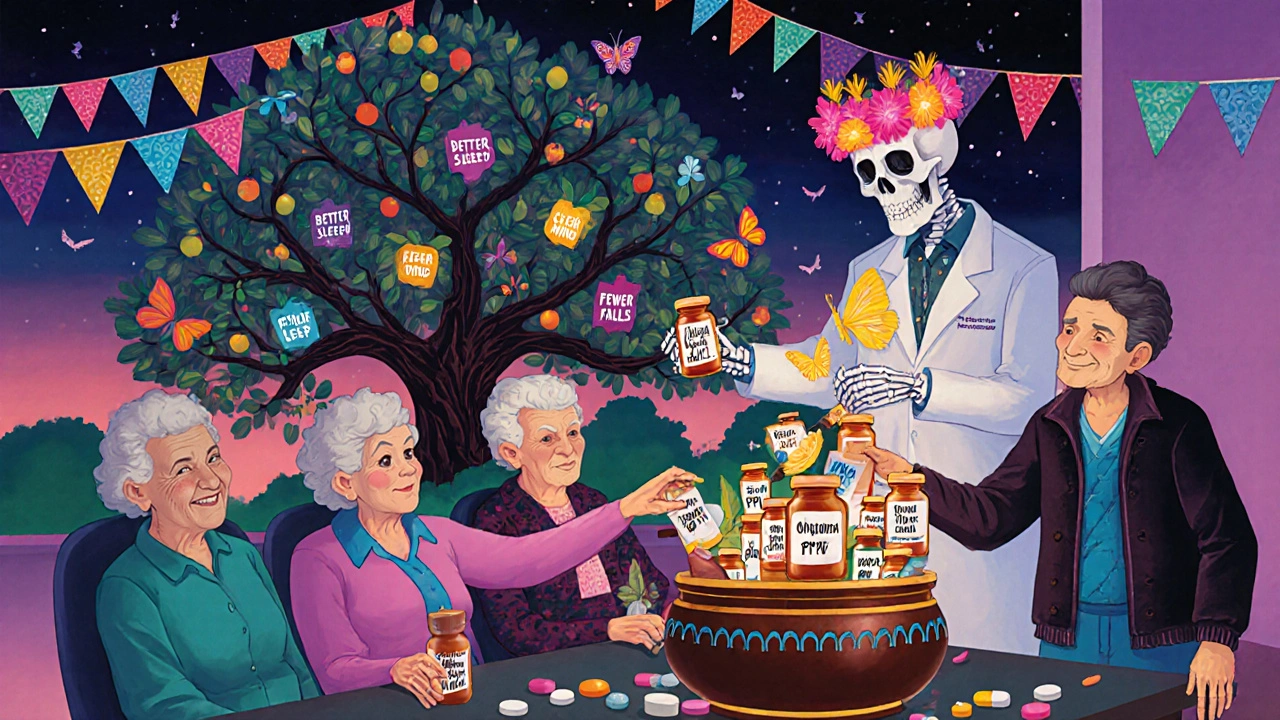
Why Don’t More Doctors Do This?
It’s not that they don’t want to. It’s that the system doesn’t make it easy.
Doctors are trained to prescribe. Not to stop. Medical school barely teaches deprescribing. Electronic health records don’t flag which meds might be unnecessary. Insurance doesn’t pay for time spent reviewing a patient’s full list. And patients? They often think if a doctor gave them a pill, it must be essential.
One study found that 80% of seniors would be open to reducing meds - if their doctor brought it up. But only 12% said their doctor ever did. That gap is huge. Patients wait for permission. Doctors wait for a reason. And the pills keep piling up.
There’s also fear. What if the pain comes back? What if the blood pressure spikes? What if they die? That’s why shared decision-making is key. It’s not about the doctor deciding. It’s about the doctor and patient sitting down, looking at the risks and benefits together, and choosing what matters most to them - whether that’s avoiding dizziness, staying independent, or just sleeping through the night.
Who Benefits Most?
Deprescribing isn’t for everyone. But it’s especially powerful for:
- Older adults with multiple chronic conditions. The more diseases you have, the more meds you’re likely on - and the higher the risk of harmful overlaps.
- People with dementia or advanced frailty. Preventive meds like statins or osteoporosis drugs often have no benefit when life expectancy is short. The focus shifts to comfort, not longevity.
- Those on high-risk drugs. Benzodiazepines, antipsychotics, NSAIDs, and long-term PPIs have well-documented dangers in seniors.
- People who’ve had a recent hospital stay. Hospitals often add meds to treat symptoms or prevent complications. But once you’re home, many of those aren’t needed anymore. Coordination between hospital and GP is critical here.
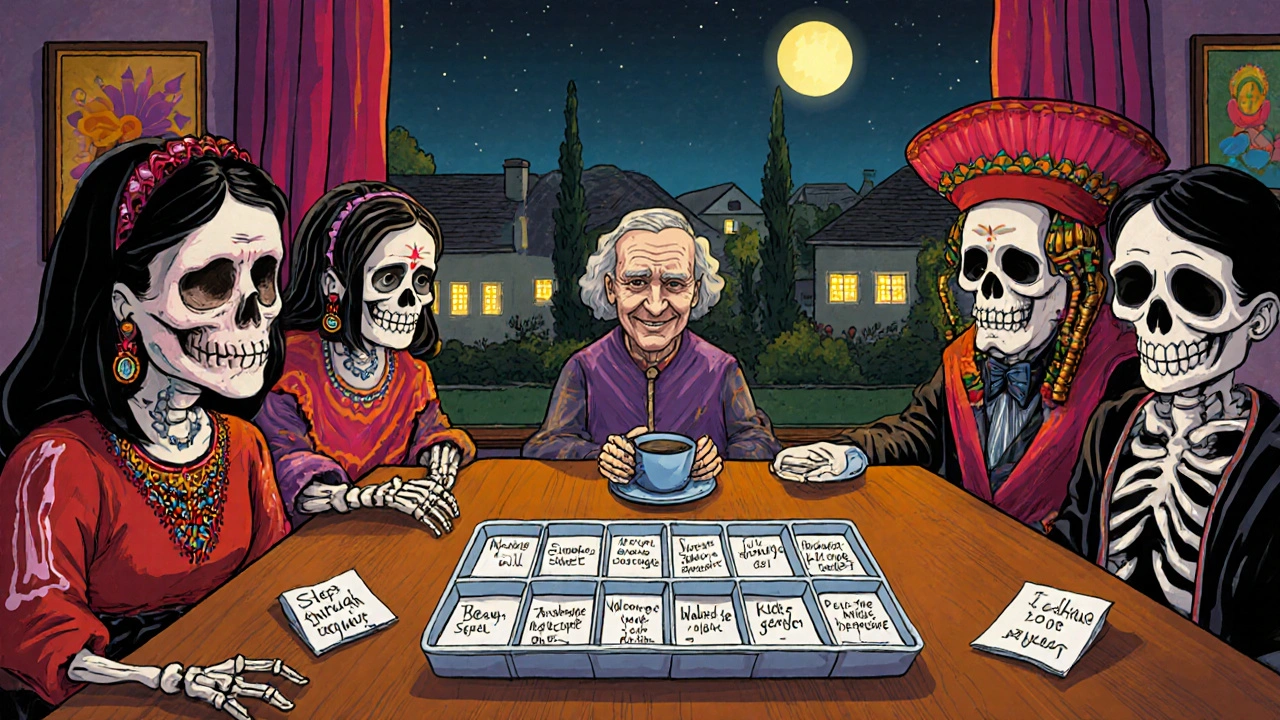
The Bigger Picture: Why This Matters Now
By 2030, one in five Americans will be over 65. In Australia, that number is already climbing fast. More older adults means more polypharmacy. More polypharmacy means more falls, more confusion, more ER visits - and more waste.
Health systems are starting to notice. The American Geriatrics Society now includes deprescribing in its official Beers Criteria for inappropriate prescribing. The Institute for Healthcare Improvement has built toolkits for clinics to track and reduce unnecessary meds. In Melbourne, some primary care networks are piloting automated alerts in electronic records that flag patients on five or more meds - and suggest a review.
And patients? They’re ready. The website deprescribing.org has been downloaded over half a million times since 2015. People are searching for this. They want to feel in control. They don’t want to be defined by their pill bottles.
What’s Next for Deprescribing?
Research is moving fast. Scientists are building algorithms to predict which meds are safest to stop for each person - based on age, genetics, kidney function, and even gut microbiome data. Early work shows that people with certain genetic markers metabolize benzodiazepines slower, making them more prone to side effects. That could one day mean personalized deprescribing plans.
Another big push: better tools for doctors. The American Academy of Family Physicians is testing software that pulls data from EHRs and suggests a list of meds to review during a 15-minute appointment. In pilot clinics, this cut inappropriate prescribing by 15% in just six months.
The goal isn’t to eliminate all meds. It’s to make sure every pill on your list still has a reason to be there. That’s the real win.
Is deprescribing the same as stopping meds on my own?
No. Deprescribing is a supervised, planned process done with your doctor. Stopping meds on your own - especially things like blood pressure pills, antidepressants, or seizure drugs - can be dangerous. Withdrawal symptoms, rebound effects, or sudden health crashes can happen. Always talk to your doctor before making any changes.
Will I feel worse when I stop a medication?
Sometimes, briefly. For example, stopping a proton pump inhibitor (PPI) for acid reflux can cause temporary rebound heartburn. Stopping a sleep aid might lead to a few nights of poor sleep. But these are usually short-lived - and often better than the long-term side effects of the drug itself. Your doctor will help you manage this transition.
Can deprescribing help me live longer?
It’s not proven yet to extend life directly. But it can help you live better - with fewer falls, clearer thinking, less dizziness, and fewer hospital visits. For older adults, quality of life often matters more than just adding years. And reducing medication burden may lower the risk of deadly interactions, which could indirectly improve survival.
What if I’ve been on a medication for years - is it still safe to stop?
Long-term use doesn’t make a drug necessary. Many people take pills for conditions that have changed - like high cholesterol after a heart attack, or acid reflux from stress that’s now gone. What was helpful ten years ago might be outdated now. Your doctor can assess whether the original reason still applies, based on your current health.
How do I start a conversation about deprescribing with my doctor?
Try this: "I’ve been taking these meds for a while, and I’m wondering if we could review them together. I’d like to know if any of them might not be needed anymore, or if we could reduce the number. I want to stay healthy without taking more pills than necessary." Most doctors appreciate this kind of thoughtful, proactive approach.

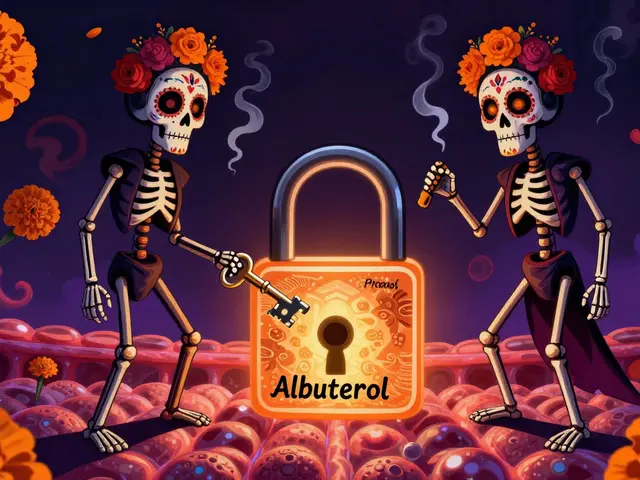
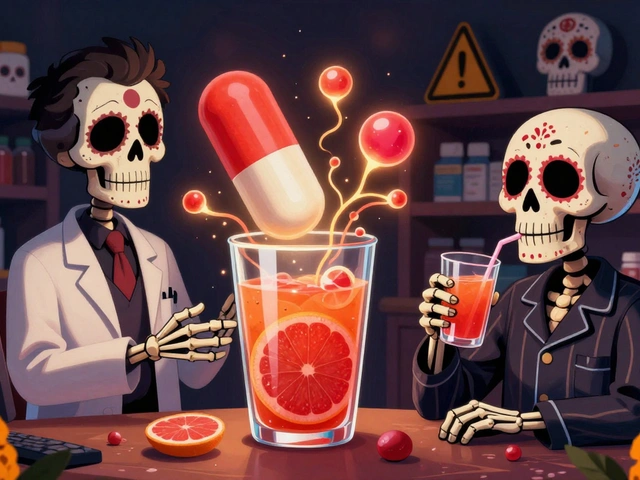


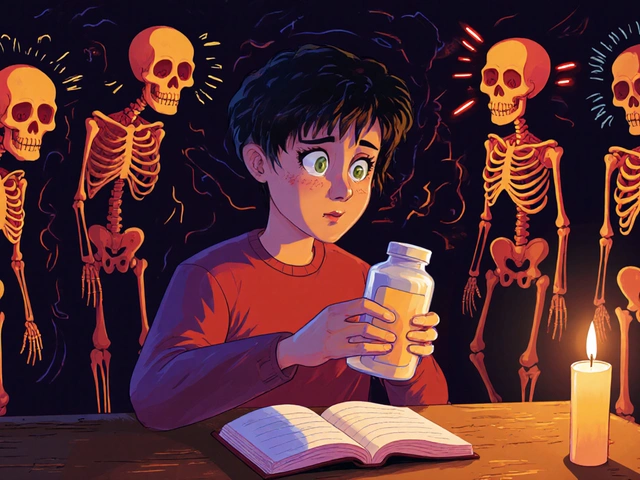
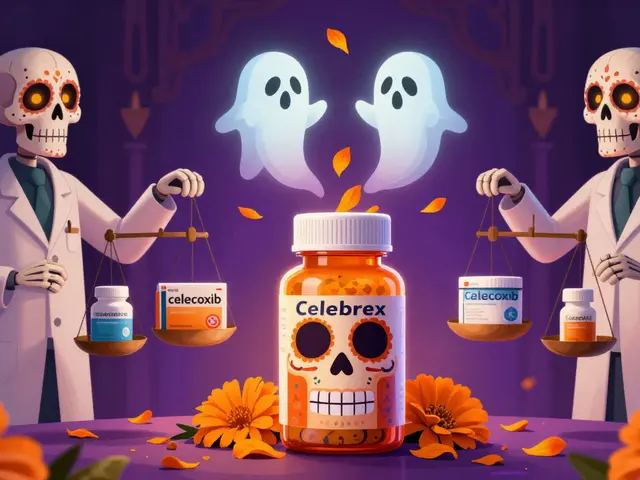


This is the kind of stuff that actually saves lives. I've seen grandmas on 12 meds who could barely walk, then after a careful taper, they're gardening again. Why isn't this standard practice?
I'm a nurse in Delhi and I see this daily. Elders take everything the doctor gives them-no questions asked. But when we gently suggest cutting one, their eyes light up. They say, 'I feel lighter.' It's not about the pills. It's about feeling like yourself again.
Let me tell you something they don't want you to know. Big Pharma doesn't profit from deprescribing. That's why your doctor never brings it up. They get paid per prescription, not per health outcome. The whole system is rigged to keep you medicated. Look at the stats-40% of seniors on five or more meds? That's not medicine. That's corporate control disguised as care. And don't get me started on how the EHRs are coded to push more drugs, not fewer.
I love this. In Ireland, we’ve got a quiet revolution happening in GP clinics. Older patients are starting to ask for med reviews. It’s not loud, but it’s real. One woman stopped her statin after 12 years-her cholesterol went up a bit, but she stopped feeling like a zombie. She said, 'I’d rather be awake and a little riskier than asleep and safe.' Couldn’t have said it better.
I work in geriatric pharmacy. The biggest hurdle? Patients think if a pill was prescribed, it’s sacred. We had a guy on gabapentin for 'nerve pain' for 8 years-he’d never been diagnosed with neuropathy. Just a leftover script from a back injury. Stopped it. No rebound. He slept better. His wife cried. Said he finally sounded like himself again.
Medicine has forgotten that the body is not a machine to be fixed with parts. It’s a living system. When you add too many chemicals, you don’t heal-you disrupt. Deprescribing isn’t anti-medicine. It’s a return to wisdom. What is health, really? Is it the absence of numbers on a chart? Or the presence of peace, clarity, and the ability to taste your coffee without dizziness?
Wow. So the system is broken, but also... we’re all just kinda fine with it? I mean, I get it. Doctors are overworked. Patients don’t want to be the one who says 'I think this pill is making me weird.' But we’re all just quietly suffering so the machine keeps running. Classic.
I’m from Texas. My aunt was on 11 meds. One was for 'anxiety' that she didn’t even have. She was just lonely. They gave her a benzo. She stopped going to church. Stopped talking to her grandkids. We tapered her off. She started knitting again. Now she sends me hand-knitted socks every Christmas. That’s the real ROI right there. No pill can buy that.
The five-step framework outlined here is clinically sound and aligns with the 2023 Beers Criteria revisions. Documentation, tapering protocols, and monitoring intervals are essential. However, implementation remains inconsistent due to fragmented care coordination and lack of standardized EHR integration. Systemic change requires policy incentives and clinician education.
I just want to say-thank you-for writing this. Seriously. I’ve been trying to get my mom to talk to her doctor about cutting her PPI and her sleeping pill for two years. She was terrified. But now? She’s reading this. And I think… maybe she’ll finally say something. I’m so proud of her.
Oh please. You think this is new? I’ve been on 12 meds since I was 50. I’ve been told to stop everything three times. Each time, I got worse. Now I’m on 15. The doctors just keep adding more. You think this is 'deprescribing'? It’s just another form of medical gaslighting.
OMG this is sooo important!! 🙌 I literally just stopped my statin last month and now I have more energy than I have since college!! 🌞✨ #DeprescribingIsTheFuture #NoMorePillBottles #LivingMyBestLife
The research is clear. The process is safe. The need is urgent.
Wait so you're saying I can just stop taking my blood pressure meds if I feel like it? My cousin did that and ended up in the hospital. Are you telling people to be reckless?
I come from a family where doctors are treated like gods. But I’ve seen what happens when you stop unnecessary pills. My father stopped his daily aspirin after 15 years. He didn’t have a heart attack. He didn’t die. He just felt less bloated, less sleepy. He started walking again. Sometimes, the most powerful medicine is the one you don’t take.
You know who’s behind this? The WHO. They want to depopulate the elderly. They’ve been pushing this 'reduce meds' agenda for years. It’s not about safety-it’s about cost-cutting. Look at the funding sources. Who owns deprescribing.org? Who profits? You think this is about health? It’s about control.